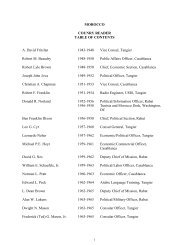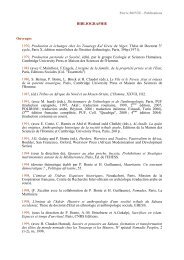- Page 1:
Disputed desert
- Page 4 and 5:
Cover illustration: painting of Tam
- Page 7 and 8:
ContentsList of photos ixList of ta
- Page 9 and 10:
List of photos1.1 Bouyagui ould Abi
- Page 11 and 12:
But of course, most important were
- Page 13 and 14:
names, which I have found in many d
- Page 15 and 16:
urnousCantonCerclecheick (Ar.)Comma
- Page 17 and 18:
tayitetefoghessategezéteghereteher
- Page 19 and 20:
POLISARIOPSIPSPTSCTIUDPMUMADDUNHCRU
- Page 21 and 22:
Movement Date of creation Motivatio
- Page 23 and 24:
FM 62 Afaires Politiques: AOF-AEF (
- Page 25 and 26:
for his generosity in providing me
- Page 27 and 28:
IntroductionWhat is Alfellaga and w
- Page 29 and 30:
INTRODUCTION 3On a political map of
- Page 31 and 32:
INTRODUCTION 5most anthropologists
- Page 33 and 34:
INTRODUCTION 7Free - unfree. The ma
- Page 35 and 36:
INTRODUCTION 9tewsit is that of a w
- Page 37 and 38:
INTRODUCTION 11ideal of temet and t
- Page 39 and 40:
INTRODUCTION 13groups were regroupe
- Page 41 and 42:
INTRODUCTION 15formally sworn to se
- Page 43 and 44:
INTRODUCTION 17a poem valuable is t
- Page 45 and 46:
INTRODUCTION 19Their reports reflec
- Page 47 and 48:
INTRODUCTION 21independence led to
- Page 49 and 50:
Creating Mali1From the 1960s onward
- Page 51 and 52:
Competing nationalismsCREATING MALI
- Page 53 and 54:
CREATING MALI 27achieved. In fact,
- Page 55 and 56:
CREATING MALI 29Keita and the Seneg
- Page 57 and 58:
CREATING MALI 31sions. 17 More impo
- Page 59 and 60:
CREATING MALI 33colonial administra
- Page 61 and 62:
CREATING MALI 35Koutiala, Bougouni,
- Page 63 and 64:
CREATING MALI 37Azawad areas, the f
- Page 65 and 66:
CREATING MALI 39tribe in Gourma Rha
- Page 67 and 68:
CREATING MALI 41tical party, the Na
- Page 69 and 70:
CREATING MALI 43One problem in the
- Page 71 and 72:
CREATING MALI 45Of all the officers
- Page 73 and 74:
CREATING MALI 47According to Bruce
- Page 75 and 76:
CREATING MALI 49arrival he organise
- Page 77 and 78:
CREATING MALI 51sion. 79 At its ina
- Page 79 and 80:
CREATING MALI 53balance yet. The Na
- Page 81 and 82:
CREATING MALI 55the means to stop t
- Page 83 and 84:
CREATING MALI 57Moroccan AJM member
- Page 85 and 86:
CREATING MALI 59This was perhaps du
- Page 87 and 88:
CREATING MALI 61jihad-states and th
- Page 89 and 90:
CREATING MALI 63national radio. Eac
- Page 91 and 92:
CREATING MALI 65to higher ranks to
- Page 93 and 94:
CREATING MALI 67searchers studying
- Page 95 and 96:
CREATING MALI 69rule: a means to ta
- Page 97 and 98:
CREATING MALI 71rally, were arreste
- Page 99 and 100:
CREATING MALI 73policies. To purge
- Page 101 and 102:
RACE, STEREOTYPES AND POLITICS 75Af
- Page 103 and 104:
RACE, STEREOTYPES AND POLITICS 77Bu
- Page 105 and 106:
RACE, STEREOTYPES AND POLITICS 79re
- Page 107 and 108:
RACE, STEREOTYPES AND POLITICS 81by
- Page 109 and 110:
RACE, STEREOTYPES AND POLITICS 83so
- Page 111 and 112:
RACE, STEREOTYPES AND POLITICS 85th
- Page 115 and 116:
RACE, STEREOTYPES AND POLITICS 89fr
- Page 117 and 118:
RACE, STEREOTYPES AND POLITICS 91la
- Page 119 and 120:
RACE, STEREOTYPES AND POLITICS 93Af
- Page 121 and 122:
RACE, STEREOTYPES AND POLITICS 95re
- Page 123 and 124:
RACE, STEREOTYPES AND POLITICS 97va
- Page 125 and 126:
RACE, STEREOTYPES AND POLITICS 99ar
- Page 127 and 128:
RACE, STEREOTYPES AND POLITICS 101b
- Page 129 and 130:
RACE, STEREOTYPES AND POLITICS 103S
- Page 131 and 132:
RACE, STEREOTYPES AND POLITICS 105I
- Page 133 and 134:
RACE, STEREOTYPES AND POLITICS 107m
- Page 135 and 136:
RACE, STEREOTYPES AND POLITICS 109T
- Page 137 and 138:
RACE, STEREOTYPES AND POLITICS 111t
- Page 139 and 140:
RACE, STEREOTYPES AND POLITICS 113i
- Page 141 and 142:
MALI’S MISSION CIVILISATRICE 115a
- Page 143 and 144:
MALI’S MISSION CIVILISATRICE 117I
- Page 145 and 146:
MALI’S MISSION CIVILISATRICE 119M
- Page 147 and 148:
MALI’S MISSION CIVILISATRICE 121w
- Page 149 and 150:
MALI’S MISSION CIVILISATRICE 123a
- Page 151 and 152:
MALI’S MISSION CIVILISATRICE 125a
- Page 153 and 154:
MALI’S MISSION CIVILISATRICE 127w
- Page 155 and 156:
MALI’S MISSION CIVILISATRICE 129n
- Page 157 and 158:
MALI’S MISSION CIVILISATRICE 131T
- Page 159 and 160:
MALI’S MISSION CIVILISATRICE 133t
- Page 161 and 162:
MALI’S MISSION CIVILISATRICE 135T
- Page 163 and 164:
MALI’S MISSION CIVILISATRICE 137p
- Page 165 and 166:
MALI’S MISSION CIVILISATRICE 139f
- Page 167 and 168:
MALI’S MISSION CIVILISATRICE 141T
- Page 169 and 170:
MALI’S MISSION CIVILISATRICE 143F
- Page 171 and 172:
MALI’S MISSION CIVILISATRICE 145T
- Page 173 and 174:
MALI’S MISSION CIVILISATRICE 147U
- Page 175 and 176:
MALI’S MISSION CIVILISATRICE 149Z
- Page 177 and 178:
MALI’S MISSION CIVILISATRICE 151a
- Page 179 and 180:
Alfellaga4Declaration received from
- Page 181 and 182:
ALFELLAGA 155Tamasheq society in or
- Page 183 and 184:
ALFELLAGA 157- and the others. He w
- Page 185 and 186:
ALFELLAGA 159The reasons are numero
- Page 187 and 188:
ALFELLAGA 161as we do from the Fren
- Page 189 and 190:
ALFELLAGA 163The initial group of a
- Page 191 and 192:
ALFELLAGA 165ag Saghid, chief of th
- Page 193 and 194:
ALFELLAGA 167southward to Kidal. He
- Page 195 and 196:
ALFELLAGA 169cars from the Bamako b
- Page 197 and 198:
ALFELLAGA 171attentively, and in th
- Page 199 and 200:
ALFELLAGA 173behaviour and warrior
- Page 201 and 202:
ALFELLAGA 175was clear to the Malia
- Page 203 and 204:
ALFELLAGA 177civilians, whom they v
- Page 205 and 206:
ALFELLAGA 179clude extreme obesity
- Page 207 and 208:
ALFELLAGA 181diary. In return for h
- Page 209 and 210:
ALFELLAGA 183To those who could not
- Page 211 and 212:
ALFELLAGA 185cheick, and one of the
- Page 213 and 214:
ALFELLAGA 187dead, followed by the
- Page 215 and 216:
ALFELLAGA 189portance of Alfellaga
- Page 217 and 218:
ALFELLAGA 191well, Diby said, I sha
- Page 219 and 220:
REVOLUTION: TESHUMARA AND TANEKRA 1
- Page 221 and 222:
REVOLUTION: TESHUMARA AND TANEKRA 1
- Page 223 and 224:
REVOLUTION: TESHUMARA AND TANEKRA 1
- Page 225 and 226:
REVOLUTION: TESHUMARA AND TANEKRA 1
- Page 227 and 228:
REVOLUTION: TESHUMARA AND TANEKRA 2
- Page 229 and 230:
REVOLUTION: TESHUMARA AND TANEKRA 2
- Page 231 and 232:
REVOLUTION: TESHUMARA AND TANEKRA 2
- Page 233 and 234:
REVOLUTION: TESHUMARA AND TANEKRA 2
- Page 235 and 236:
REVOLUTION: TESHUMARA AND TANEKRA 2
- Page 237 and 238:
REVOLUTION: TESHUMARA AND TANEKRA 2
- Page 239 and 240:
REVOLUTION: TESHUMARA AND TANEKRA 2
- Page 241 and 242:
REVOLUTION: TESHUMARA AND TANEKRA 2
- Page 243 and 244:
REVOLUTION: TESHUMARA AND TANEKRA 2
- Page 245 and 246:
REVOLUTION: TESHUMARA AND TANEKRA 2
- Page 247 and 248:
REVOLUTION: TESHUMARA AND TANEKRA 2
- Page 249 and 250: REVOLUTION: TESHUMARA AND TANEKRA 2
- Page 251 and 252: REVOLUTION: TESHUMARA AND TANEKRA 2
- Page 253 and 254: REVOLUTION: TESHUMARA AND TANEKRA 2
- Page 255 and 256: REVOLUTION: TESHUMARA AND TANEKRA 2
- Page 257 and 258: REVOLUTION: TESHUMARA AND TANEKRA 2
- Page 259 and 260: REVOLUTION: TESHUMARA AND TANEKRA 2
- Page 261 and 262: REVOLUTION: TESHUMARA AND TANEKRA 2
- Page 263 and 264: REVOLUTION: TESHUMARA AND TANEKRA 2
- Page 265 and 266: REVOLUTION: TESHUMARA AND TANEKRA 2
- Page 267 and 268: REVOLUTION: TESHUMARA AND TANEKRA 2
- Page 269 and 270: REVOLUTION: TESHUMARA AND TANEKRA 2
- Page 271 and 272: REVOLUTION: TESHUMARA AND TANEKRA 2
- Page 273 and 274: REVOLUTION: TESHUMARA AND TANEKRA 2
- Page 275 and 276: Rebellion: Al-Jebha (1990-1996)6On
- Page 277 and 278: REBELLION: AL-JEBHA 251movement pro
- Page 279 and 280: REBELLION: AL-JEBHA 253area simulta
- Page 281 and 282: REBELLION: AL-JEBHA 255traditional
- Page 283 and 284: REBELLION: AL-JEBHA 257they were sh
- Page 285 and 286: REBELLION: AL-JEBHA 259on both side
- Page 287 and 288: REBELLION: AL-JEBHA 261because of s
- Page 289 and 290: REBELLION: AL-JEBHA 263The ‘confu
- Page 291 and 292: REBELLION: AL-JEBHA 265We have crea
- Page 293 and 294: REBELLION: AL-JEBHA 267fledged VIII
- Page 295 and 296: REBELLION: AL-JEBHA 269The wise men
- Page 297 and 298: REBELLION: AL-JEBHA 271town of El G
- Page 299: REBELLION: AL-JEBHA 273gration in c
- Page 303 and 304: REBELLION: AL-JEBHA 277a pilot proj
- Page 305 and 306: REBELLION: AL-JEBHA 279of a large t
- Page 307 and 308: REBELLION: AL-JEBHA 281tewsit had f
- Page 309 and 310: REBELLION: AL-JEBHA 283siten in Nor
- Page 311 and 312: REBELLION: AL-JEBHA 285on the crowd
- Page 313 and 314: REBELLION: AL-JEBHA 287ation to Zah
- Page 315 and 316: REBELLION: AL-JEBHA 289the Western
- Page 317 and 318: REBELLION: AL-JEBHA 291are, the mor
- Page 319 and 320: REBELLION: AL-JEBHA 293ness; deceit
- Page 321 and 322: REBELLION: AL-JEBHA 295many bellah
- Page 323 and 324: REBELLION: AL-JEBHA 297origins. Dur
- Page 325 and 326: REBELLION: AL-JEBHA 299the Malian G
- Page 327 and 328: REBELLION: AL-JEBHA 301As his leade
- Page 329 and 330: REBELLION: AL-JEBHA 303and organise
- Page 331 and 332: REBELLION: AL-JEBHA 305movie is ins
- Page 333 and 334: REBELLION: AL-JEBHA 307cook in. In
- Page 335 and 336: CONCLUSIONS 309of a new political e
- Page 337 and 338: CONCLUSIONS 311to promote the inter
- Page 339 and 340: CONCLUSIONS 313course on ‘the oth
- Page 341 and 342: CONCLUSIONS 315the egha of the imgh
- Page 343 and 344: EPILOGUE 317from the Gulf and Saudi
- Page 345 and 346: EPILOGUE 319The programme first too
- Page 347 and 348: EPILOGUE 321In most of Mali the new
- Page 349 and 350: EPILOGUE 323based in traditional So
- Page 351 and 352:
EPILOGUE 325The GSPC is an offshoot
- Page 353 and 354:
EPILOGUE 327addition, American troo
- Page 355 and 356:
EPILOGUE 329A further problem in bo
- Page 357 and 358:
EPILOGUE 331onally sent to the so-c
- Page 359 and 360:
EPILOGUE 333attention could put pre
- Page 361 and 362:
EPILOGUE 335Whereas the National Pa
- Page 363 and 364:
EPILOGUE 337besieging the Malian Ar
- Page 365:
EPILOGUE 339return for personal car
- Page 368 and 369:
342 REFERENCESBERNUS, E. (1981), To
- Page 370 and 371:
344 REFERENCESCRAWFORD YOUNG, M. (1
- Page 372 and 373:
346 REFERENCESJAMOUS, R. (1981), Ho
- Page 374 and 375:
348 REFERENCESNADI, D. (2007), Inst
- Page 376 and 377:
350 REFERENCESTRIAUD, J-L. (1986),
- Page 378 and 379:
352 REFERENCESS. TAMASHEQ, woman wh
- Page 380 and 381:
354 REFERENCESUnpublished manuscrip
- Page 382 and 383:
356 REFERENCESKAUFMANN, H. (1964),
- Page 385 and 386:
IndexAbdelaziz Bouteflika · 147Abd
- Page 387 and 388:
INDEX 361CRN · 269Dabakar · 202,
- Page 389 and 390:
INDEX 363Kel Intessar · 37, 39, 49
- Page 391 and 392:
INDEX 365sattefen · 83, 84, 298, 3









